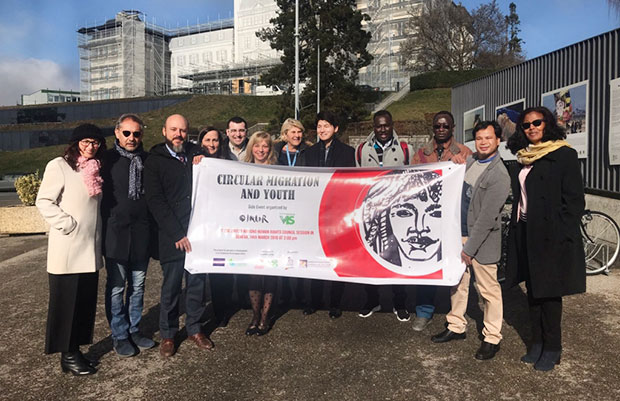
Improving Migrant Opportunities in Senegal
Five years ago, Seny Diallo risked his life in search of a better future: fleeing his desperately impoverished hometown of Tambacounda, Senegal, for Europe’s distant shores. Today, thanks to Salesian missionaries, he returns to his country equipped with the knowledge, skills and deeply personal motivation to address the root causes of youth migration.
“When we go, we do not think that we can lose our lives,” Seny explains. “We want a better life, we want to defeat poverty, so we close our eyes and leave … relying on strangers to get to Europe.”
Seny’s own treacherous month-long journey led him through the scorching desert and over the tumultuous sea before he arrived in Lampedusa, Italy with nothing to his name, and no one to help him navigate the complexities of his new home.
And yet, Seny is among the fortunate ones; thousands of others like him never make it. While the number of migrants attempting to cross the Mediterranean have dropped in the last year, the number of deaths more than doubled. This is why our Salesian missionaries are passionate about assisting young people in search of a better life, both in the countries where they arrive, and — perhaps more importantly — in the countries they seek to leave.
“The single most predictive factor for youth migration is the lack of meaningful employment opportunities at home,” says Father Mark Hyde, Director of Salesian Missions. “In countries like Senegal, young people feel they have nothing to lose by fleeing poverty and hopelessness, yet far too often, the results are tragic. In order to prevent this, our missionaries work to identify sectors, such as agriculture, that can contribute to sustainable development, and offer vocational training courses around those, so that youth have a reason to stay.”
Seny hopes to serve as a poster boy for such efforts.
In Lampedusa, Seny first encountered our missionaries who directed him to the Salesian Aidone Center. Operated by Don Bosco 2000, an association serving those who live in situations of social, economic and intellectual disadvantage, Aidone welcomes unaccompanied foreign minors from across Africa and the Middle East, and provides the holistic social services they need to successfully integrate into their host communities. After he proved adept at learning languages, Aidone administrators hired Seny as a cultural mediator — a job with which he supported himself for two years. But the echoes of home tugged at his heart.
Today, thanks to a partnership between Don Bosco 2000 and Salesian missionaries in Senegal, Seny has been able to return home. He now leads a “circular migration” pilot project whose successful implementation will hold significant promise for future interventions.
Widely considered one of the most advanced approaches to tackling the issue of youth migration, circular migration describes, and supports, the free movement of migrant individuals between their host and home countries. In the Salesian context, particularly, the goal is to train youth to bring specialized skills back to their cities and villages of origin, and teach those skills to others, so that fewer are tempted to leave. Further, through fostering entrepreneurship and the development of micro-businesses, circular migration projects create concrete employment opportunities that support the local economy.
In Tambacounda, working from the newly launched Small Projects Office on the Salesian campus, Seny has recruited four local youth, who were at risk of migration, to start a small farm. Two participants, Jeronime and Maxime, previously completed a Salesian-led agricultural course. Doudou, is already an expert farmer and Adama donated the land they will use to grow food.
“I’m extremely motivated to provide opportunities for young people to stay in Senegal,” Seny says. “We may not have the technology or innovation that is available in Europe, but we have the sun, the water, and the climate. If we start, other Senegalese kids will be able to copy our example. In this way, we hope to convince kids who want to leave, and risk losing their lives, to stay and launch their own agricultural businesses instead.”
Our mission tackles youth migration by improving educational and employment opportunities in their home countries. What’s your mission?

